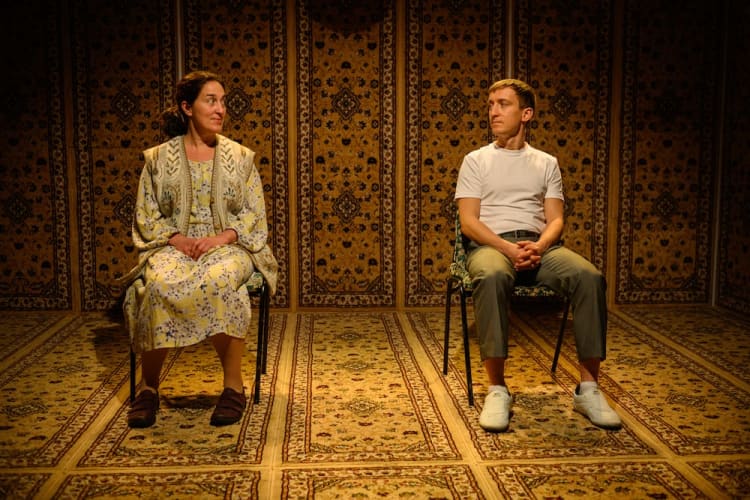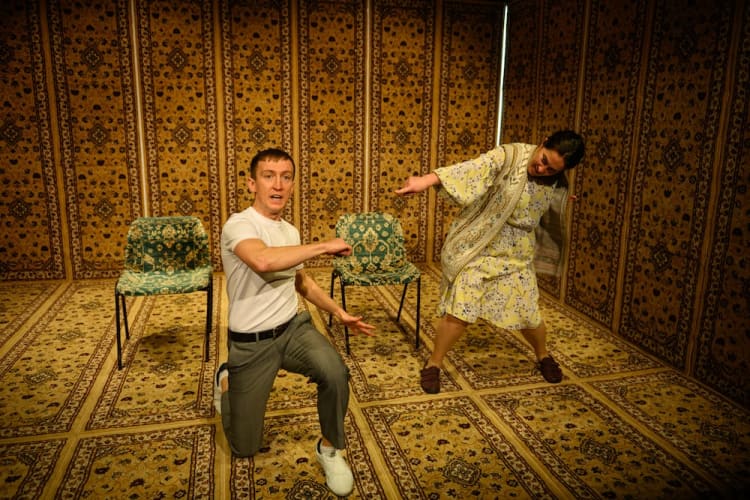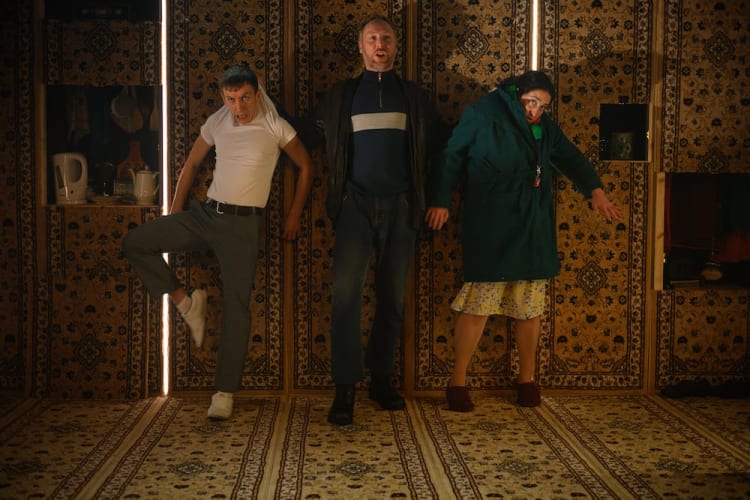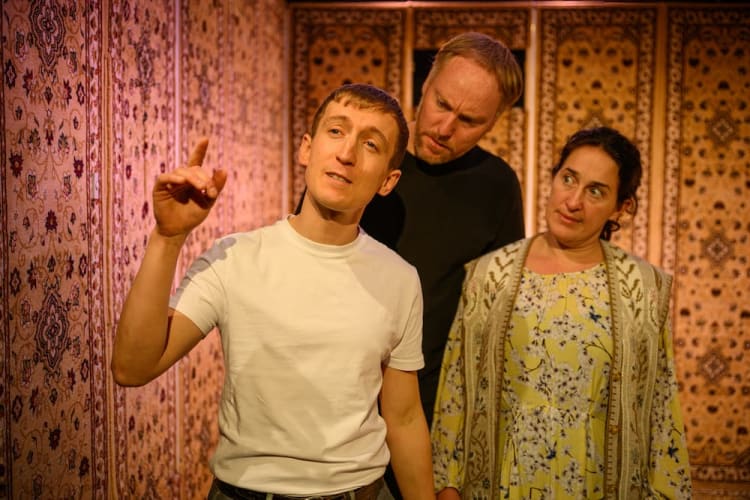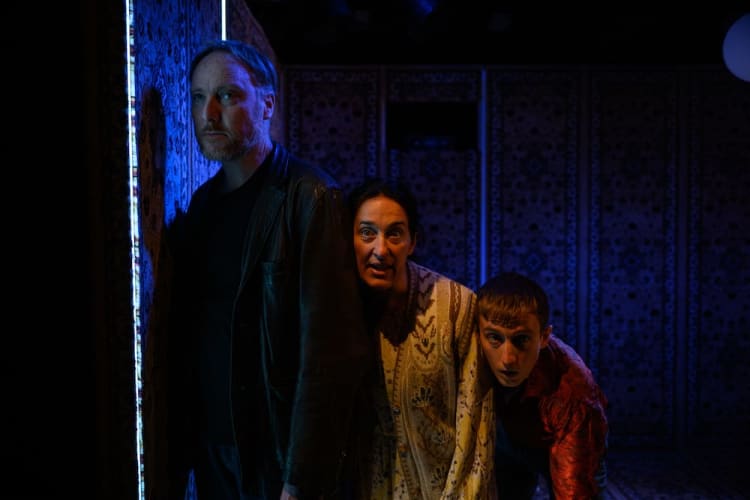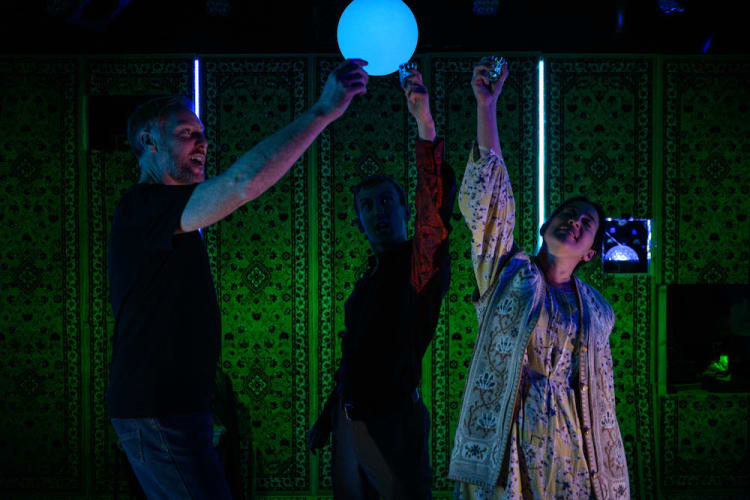Winner of Theatre503’s 2023 International Playwriting Award, writer and director (in association with movement director Sam Hooper) Roxy Cook’s first play is an absurdist take on contemporary Russia, triggered by a personal event (she dedicates it to her babushka). It resonates loud and clear with my experiences. Every line rings true.
Russia has been seen through many a satirical and fantastical lens in the past centuries. Cook dares to follow in their giant footsteps. I’m thinking Gogol, Bulgakov, Daniil Kharms and more. You might come up with others… Ionesco, and stand-up comedy... How else to deal with Russia’s contradictions, absurdities and transparent lies—a legacy of the Soviet Union—but with laughter, laughter through tears…
There’s a fairy tale quality, too, in the resolution. An old woman (Giulia Innocenti), a confused old lady with memory failure, gets the better of a young bank manager (Sam Newton) and a debt collector (Keith Dunphy). Never take on an old Russian woman, she’s been there and done that. Born in 1936, she has lived through the Stalin era, she is tempered by its deprivations (How The Steel Was Tempered is a Soviet novel). She can even drink them under the table with her homebrew.
She knows how to protect herself by instinct even though her brain is befuddled. But the journey from beginning to end is a feat of keeping us in suspense. Set in 2018, the year of the World Cup, Moscow is portrayed in all its present “opium for the masses” glory: twenty-five golden cupola churches have been built that year alone to the deficit of funds for schools and hospitals.
Everyone is on the make, money the ultimate goal by whatever means. Russian fatalism meets hedonistic lifestyles at the expense of scammed others. The cat trying to cross Moscow’s ten-lane traffic and its diabolic drivers is one of many comic episodes on Christmas Eve. The old lady’s reminiscence about tangerines I recognise from my times visiting Moscow in the Soviet era. I could add one about bananas.
On a compact stage, ingeniously designed by David Allen, the three actors brilliantly play several roles, as well as the cat (in duplicate and triplicate). They are narrators and chorus, too. It is fourth-wall-breaking storytelling—the front row gets much eye contact. The cat has a name (Sally), the universal human trio has no names, designated only as A, B and C. It’s shape-shifting, role-playing, physical theatre. Timing is important—you can see why the play needs a movement director. Joe Price’s lighting plays with time and mood.
Modern Russian music plays, rap and pop (“we couldn't care less” a nihilistic line maybe not in satirical singer songwriters Vysotsky, Okudzhava, Galich of the Soviet era league) give the play a soundscape (Hugh Sheehan) that is Russian contemporary. It underpins the comical dancing and the sense of abandon, of escape from reality.
The deceptively simple set, made up of oriental rugs, floor and walls, two, later three, chairs, reveals a treasury of props behind concealing panels. Where she has hidden her money even she can’t remember. The concept has a tenuous something of Ilf and Petrov’s Twelve Chairs.
The old woman, alone, neglected by her émigré daughter, she thinks, who keeps sending her money, does not trust banks, so why does she one day walk into the bank across the road? Because of the welcoming smiley man on its poster. The lost cat walks into the bank for the same reason. The old woman is offered a very high interest loan, which she doesn't need and doesn't understand, and forgets about.
This sets the tale in motion, gently mocking a country sinking, already sunk, in the mire of self-serving corruption, perhaps apathy in the service of self-preservation, but not without some tender and compassionate touches. Russia was once described to me as both cruel and sentimental.
Difficult to navigate, but navigate the Russian soul Cook does very ably, she knows of what she speaks. It's simple and complicated, like the baggy play itself. Sherlock Holmes on the TV, blocks of flats still overheated, “no free lunches in Russia” the debt collector says twice, souls bought and sold.
